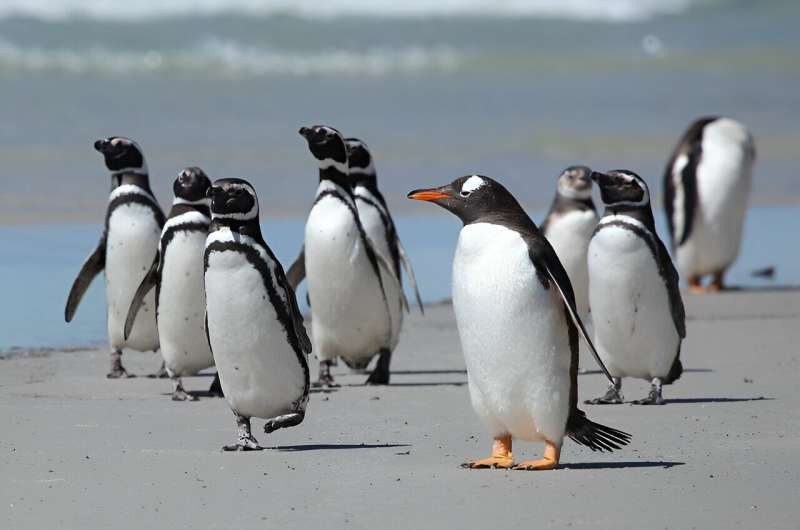This article has been reviewed according to Science X's editorial process and policies. Editors have highlighted the following attributes while ensuring the content's credibility:
fact-checked
trusted source
proofread
Impact of synbiotic supplements on the gut microbiome and overall health of penguins

The gut microflora plays a pivotal role in the overall well-being of all living organisms. Like their multifaceted and beneficial role in humans, the role of the gut microbiome in maintaining health, behavior, and ecology of animals is unequivocal. Now, researchers from Japan investigated the impact of combined administration of prebiotics and paraprobiotics to understand how they impact penguin health. Parasynbiotics were found to improve gut health and reduced inflammatory responses, enhancing overall health.
A healthy gut plays an indispensable role in the absorption and metabolism of nutrients, maintaining immune function, and promoting general well-being. The profound impact of a healthy microbiome is not just limited to the gut, but there is mounting evidence that it influences almost every function of the body. Thus, the composition of the gut microbiome becomes an important indicator of the health status of the body.
Probiotics are a type of supplement containing live strains of bacteria that improve and diversify the gut microbiome population. Lactiplantibacillus plantarum, a type of microorganism picked up from pickled vegetables, is known to be the most efficient probiotic and has been associated with varied health benefits.
On the other hand, prebiotics are non-digestible dietary fibers that act as a source of nourishment for the gut microbiome and prebiotic strains. For instance, 1-kestose, a type of fructooligosaccharide (FOS) containing sucrose and fructose, is one of the most effective prebiotics. Additionally, paraprobiotics refer to non-viable or heat-killed microbial cells and are easier to store and manufacture, as compared to probiotics.
The combination of probiotics and prebiotics is termed "synbiotics," whereas a combination of prebiotics with paraprobiotics is called "parasynbiotics."
Just like humans, a healthy gut microbiome is vital for the care and general welfare of animals. For example, Clostridium perfringens, a spore-forming bacteria, is one of the most common causes of morbidity and mortality in birds. The plc gene of the bacteria is responsible for secreting alpha-toxin, which, at higher levels, can be life-threatening for birds, including captive penguins.
While studies on the impact of probiotics and prebiotics have advanced, the impact of synbiotics and parasynbiotics on the gut health of zoo birds, specifically penguins, remains unexplored.
Advancing research on this front, Professor Takumi Tochio and Dr. Tadashi Fujii from the Department of Medical Research on Prebiotics and Probiotics, Fujita Health University, Aichi, Japan, along with their colleagues, recently attempted to fill this knowledge gap.
They investigated the effect of prebiotic 1-kestose and paraprobiotic Lactiplantibacillus plantarum FM8 on the gut microbiome of Magellanic penguins (Spheniscus magellanicus). Their study was published in the Journal of Veterinary Medical Science.
Sharing their inspiration behind the study, Prof. Tochio explains, "Although there are no reports on the intestinal microbiota of Magellanic penguins, it is conceivable that a parasynbiotic-intervention could improve their intestinal environment and provide various health benefits. Therefore, we aimed to investigate the effects of including a parasynbiotic combination in their feed on the gut microbiome and overall health."
To this end, the researchers administered parasynbiotics for 8 weeks to eight penguins aged below 3 years, referred to as the 'Young-group' and nine penguins aged above 17 years referred to as the 'Adult-group.' To analyze the impact of the parasynbiotics on the birds, genomic DNA was extracted from their feces.
16S rRNA sequencing revealed that parasynbiotic administration significantly decreased the intestinal population of the harmful Clostridiaceae_222000 in both groups. Moreover, the population of Lactobacillaceae in the Young-group significantly improved. Quantitative real-time polymerase chain reaction revealed a noteworthy decrease in the plc gene levels of C. perfringens in the Young-group.
Furthermore, plasma analyses revealed that the daily administration of parasynbiotics significantly decreased the alpha-globulin levels in the Young-group. Elevated levels of alpha-globulins often indicate inflammation, infection, and trauma. Interestingly, they also found that L. plantarum FM8 induced dendritic cells to secrete elevated levels of IL-10, an anti-inflammatory cytokine. These findings thus suggest that parasynbiotics can modulate and reduce inflammatory responses in penguins.
In summary, the study provides novel insights into the gut microflora and its modulation by parasynbiotics. Concluding optimistically, Prof. Tochio says, "Our findings that parasynbiotics have health benefits, particularly for young penguins, offer potential new strategies for maintaining animal health. With further research, these parasynbiotics may serve as tools to mitigate gut inflammatory responses and contribute to overall animal well-being."
More information: Tadashi Fujii et al, Co-administration of the prebiotic 1-kestose and the paraprobiotic Lactiplantibacillus plantarum FM8 in magellanic penguins promotes the activity of intestinal Lactobacillaceae and reduces the plc gene levels encoding Clostridium perfringens toxin, Journal of Veterinary Medical Science (2024). DOI: 10.1292/jvms.23-0238
Provided by Fujita Health University




















